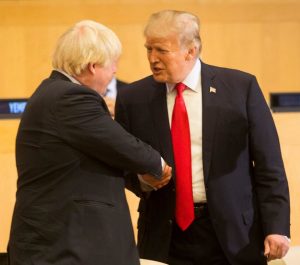
The news that the Police were called to the flat Boris Johnson shares with Carrie Symonds is (rightly) raising eyebrows.
At the time of writing this post I don’t know whether the Police will bring charges against Johnson, so we don’t know whether this should be heard as actual domestic violence, or simply a nasty row.
What’s striking is the contrast between this and the anger generated by the news of Mark Field MP “grabbing a woman by the throat” — actually a climate change protester at dinner where Philip Hammond was speaking. He’s been subject to censure and suspended as a minister, pending investigation. The implication is that it’s considered unacceptable for a junior minister to manhandle a woman who (rightly or wrongly) he perceived to be a threat, but acceptable for someone who is the front-runner to become Prime Minister to act towards his partner in a way that leads to the police being called.
My mind jumps from this to the host of allegations of sexual mis-conduct made against Donald Trump. Without those coming to trial, I can’t be certain how many of them are well-founded, but the recording of him talking of grabbing women “by the pussy” gives the very strong impression that there is a case to answer. A friend in the US who works with survivors of sexual spoke of the traumatising effect that Trump’s election had on her client group — for them, there was a major shock in going from a time when their country’s president was as trust-worthy as Barack Obama, to someone very different. If survivors of sexual assault were feeling traumatised by Trump’s election, those on the other side will have felt things differently. The danger is that it legitimises fantasies of sexual violence and domination.
In the past there have been times when there’s seemed to be something hypocritical about the way the media has treated politicians’ sexual mis-conduct. That’s not to justify mis-conduct, but in the past, I’ve wondered how many of the people involved in the writing, publishing and distribution of news had themselves done something similar. But it now feels as if, for some leaders, allegations bounce off.
The details of what Johnson (or Trump) have done are not public. But there is something going on when rumours stop attracting serious censure.
I hope I am wrong, but I am wondering whether, faced with some real anxieties, one of the things we are doing is to default to apparent certainties from another age, so the “powerful alpha male” is a figure of safety. From that perspective it’s relevant that the protester Mark Field manhandled was protesting about climate change. Whether she was right to interrupt a dinner is one question, but there’s no doubt that climate change is a very serious threat. Donald Trump’s denial of climate change has been striking, but I can read that as an alpha male exerting dominance: he tells people there isn’t a problem (so they can let go of their anxiety) and “proves” this by his alpha male status.
The trouble is that the issues we are facing are serious. Posturing alpha males who loudly say there is no problem don’t actually make the problem go away.
One of the interesting twists to this is that neither Donald Trump nor Boris Johnson are likely to be at the top of many people’s lists of sexually-attractive men. It feels like a parody of sexual attraction, tipped into the direction of domination and certainty. The question I fear I am hearing is “If he can be that dominant, will he protect me if I am on the same side?” The parallel this brings to mind is Justin Chadwick’s brilliant film The Other Boleyn Girl, which explores the court of Henry VIII through the eyes Anne Boleyn’s sister Mary. Where many history books are diplomatic about the king’s sex life, this gives a brilliant depiction of power and dominance around an absolute monarch, in the role of an alpha male — and the extremes his courtiers are going to to ensure his sexual pre-eminence, despite his clear failure to produce the expected offspring. In a crude and realistic way, power is shown as sexual power, and stability comes from people making sure nothing gets in the way of the fantasy of the king’s potency.
I like to think we are in a very different age. But that feudal way of being was “how things were” for far longer than what we have grown used to. My fear is that some of the anxieties that have led to support for Brexit and for Trump are configuring in a way that gets answered in this much more primitive way.
What compounds this is that many of the things we should be worried about — such as climate change — put us in new territory. The legitimate fears around domestic violence and sexual assault are powerful, but familiar. Perhaps there’s a level at which we welcome leaders who evoke those fears because they distract attention from the threats we need to engage with. This adds to a long list of reasons for saying that both Donald Trump and Boris Johnson might well be the leaders some people want, but they are the opposite of the leaders we actually need.